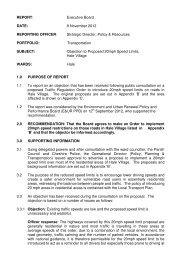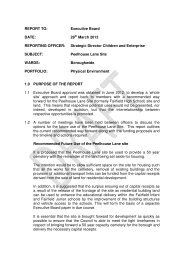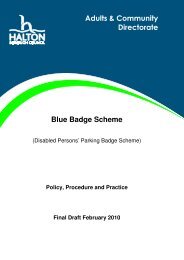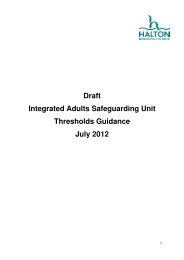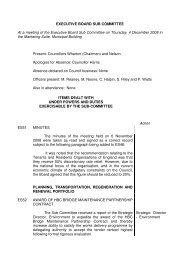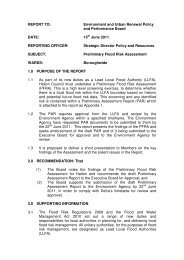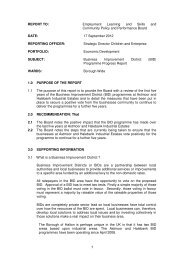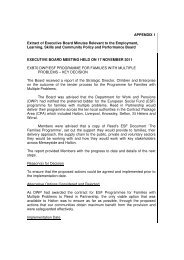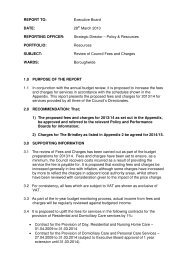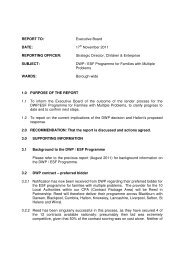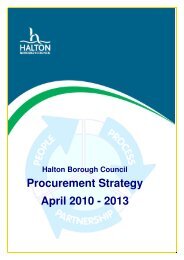000939AAC GUIDE TO PRIVATE RENTING SECTOR, item 30. PDF ...
000939AAC GUIDE TO PRIVATE RENTING SECTOR, item 30. PDF ...
000939AAC GUIDE TO PRIVATE RENTING SECTOR, item 30. PDF ...
You also want an ePaper? Increase the reach of your titles
YUMPU automatically turns print PDFs into web optimized ePapers that Google loves.
Halton Borough CouncilGuide toTHE <strong>PRIVATE</strong> RENTED SEC<strong>TO</strong>R
IntroductionPurpose of this guideThis guide is aimed at tenants and prospective tenants, landlords, elected Membersand Council officers and it is hoped that it provides a basic overview of the private rentedsector in Halton and clarifies the role of the Council in supporting the sector. Key contactsare provided for each area of support offered by the Council.Why choose the private rented sector?Since the recent decline of the housing market, the private rented sector is making anincreasingly significant contribution to meeting housing need. It is believed that in Haltonthe sector has doubled in the last 10 years and now makes up around 10% of the totalhousing stock in the borough (Halton Strategic Housing Market Assessment 2011).For tenants, the advantages are• It’s a flexible tenure, which can be useful in relation to accessing employmentopportunities• It’s an alternative option for those unable to buy or access social rented housing• There’s a lot of choice in terms of property type and location• It is a relatively affordable option in HaltonFor landlords, the advantages are• Source of regular income• Properties are more secure and are maintained when they are inhabited• There is no threat of enforcement action from the Council due to the propertybeing emptyRenting from a private landlord is a flexible option and is often suited to different peoplewith varied housing needs. The following sections explain some private sector tenancybasics.2
Private Rented TenanciesTenancy AgreementThis is a document, provided bythe landlord, at the beginningof a tenancy, which sets out therules to be followed during thetenancy. Both the landlord andtenant sign the agreement asthey are both bound by its terms.Should a tenant break the rulesoutlined in the agreement, theycan be evicted. Should a landlord break the rules, the tenant should seek advice from theCouncil or Citizens Advice Bureau and there may be a legal route to pursue.Assured Shorthold Tenancies ASTsTenancies in the private rented sector are usually assured shorthold, which means theyare for a fixed-term – usually 6 or 12 months. After this period, either the tenant or thelandlord can give the required notice to end the tenancy.Landlords must give tenants two months’ notice – they can only evict a tenant during thefixed-term period in cases where the terms of the agreement have been broken.Tenants must give their landlord one months’ notice that they wish to leave once they areout of the fixed-term period – should a tenant wish to leave during the fixed-term theymay be legally obliged to pay the rent that they owe for the duration of the term (unlessthe tenancy agreement includes a ‘break clause’).At the end of the fixed-term if both the landlord and tenant are happy to continue withthe tenancy, a new fixed-term can be agreed or the tenancy can become a periodic one,which renews itself month-by-month.3
Roles and responsibilitiesRole of letting agentsThe use of a letting agent offers the quickest way of letting a property for a landlord andfinding a property for a tenant. However, they do charge fees for their services – for atenant these can include administration fees for performing credit checks and setting upthe tenancy and for landlords the agent will charge a fee for advertising their property/setting up the tenancy and managing the tenancy (if the landlord is not managing itthemselves). It is important for tenants to find out whether their landlord or a letting agentis managing the tenancy so that they know who to contact in the event of any problems.Tenant responsibilities• Abide by the terms set out in your tenancy agreement (provided by your landlord)• Pay your rent on time• Behave in a reasonable way, not causing nuisance or annoyance to others• Not damage any fixtures, fittings or furniture belonging to the landlord• If there is any furniture in the property belonging to the landlord that you do notwant, ask them to remove it• Ask the landlord for written permission before making any changes to theproperty• Inform the landlord if repairs are needed• Allow the landlord to have access to the property at reasonable times to carry outrepairs and necessary safety checks• Not sub-let or take in a lodger without asking permission first, unless your tenancyagreement allows you to do this• Give the landlord the correct notice if you wish to leave4
Landlord responsibilities• Provide a tenancy agreement – a written statement of the conditions of the tenancy• Provide your name, address and contact details and those of your agent (ifapplicable)• Provide a rent book for tenants who pay weekly, or a receipt for the rent payment forthose who pay fortnightly or monthly by cash• Respect your tenants’ right to peace and quiet in their own home• Register your tenants’ deposit with one of the government recognised schemeswithin 30 days of receiving it and confirm details in writing to the tenant• Give reasonable notice in writing if you need to enter your tenants’ home• Give legal notice if you want the tenant to leave• Make suitable arrangements for the security of your tenants’ mail to preventinterference• Ensure that gas appliances are tested at least once a year and give your tenant acopy of the safety certificate within 28 days of the test taking place• Ensure that all upholstered furniture complies with fire safety regulations• Ensure the following are repaired, when required:• The structure of the property / Basins, baths, sinks and toiletsFires, radiators, water heaters / Water, gas and electricity supply and metersWater tanks and boilers / Appliances provided as part of the tenancy.5
Costs of a tenancyLandlords usually take a deposit from tenants (oftenit is the equivalent of one month’s rent) to safeguardthem against any damage caused by the tenant/any rent arrears that may occur. Tenants will get thismoney back at the end of the tenancy if they arenot in arrears and haven’t caused any damage.A property condition report is very important inthis respect – good landlords will provide these atthe start of a tenancy so they can be comparedto the condition the tenant leaves the property inand therefore determine if any damage has beencaused. If the landlord doesn’t offer this, tenantsshould consider taking photos to make their own record of the condition of the propertywhen they begin their tenancy.It is now a legal requirement that deposits are protected using a Governmentrecognised scheme and landlords must provide their tenant with the relevant details andconfirmation that their deposit has been protected.Rent is usually payable on a monthly basis in advance. Some people are eligible forHousing Benefit, which may cover some or all of the rent. The amount people are entitledto depends on their income and who lives with them and it is worked out using LocalHousing Allowance – rates are published monthly and displayed in the Council’s HaltonDirect Link one-stop-shops and on the Council’s website. Housing Benefit can only bepaid into a bank account.Average rent levels in HaltonSize of propertyRuncorn average per Widnes average permonthmonth1-bedroom £395 £3752-bedrooms £425 £4503-bedrooms £500 £5254-bedrooms £600 £600*Halton Strategic Housing MarketAssessment 20116
Services provided bythe CouncilEnvironmental Protection TeamThe team deal with the safety and repair of privately rented housing. They are able toassist in most cases where the condition of a home has an impact on the health andsafety of the occupier or visitors. Some of the hazards the team can deal with include thefollowing:• Urgent action to restore heating, hot water or to make dangerous electricalsystems safe• Dampness from roof leaks, pipe leaks, rising damp, condensation and mouldand dry rot infestations and improving heating systems or ventilation• Safety of gas appliances• Fire safety in the home and, in particular, Houses in Multiple Occupation,withthree or more tenants who share facilities• Overcrowded accommodationOnce the team is notified that there is a problem at a property, they will arrange to visitpeople in their homes and carry out an assessment for hazards under The Housing Health& Safety Rating System (HHSRS). In all cases the team try to work with the landlord to resolvethe problems but where necessary they can, and will, take legal action. Legal notices canbe served on the landlord to remedy hazards in the home. Should a landlord fail to comply,they can be prosecuted or the works can be carried out in default and then re-charged tothe owner.In addition, the team deal with statutory nuisance, which includes noise, odour and smokenuisance.KEY CONTACT:Wendy Salisbury – Principal Environmental Health OfficerEnvironmental and Public Health and Health Protection0151 511 7613wendy.salisbury@halton.gov.uk environmental.protection@halton.gov.uk7
Bond Guarantee SchemeFor those who are facing homelessness, the Council’s Housing Solutions Team may beable to help by providing the written promise of the deposit amount should it be requiredat the end of a tenancy. This allows people who do not have the funds for the depositthemselves to access privately rented housing.The Housing Solutions Team also provide advice on all aspects of homelessness andhousing options.KEY CONTACT:Lucy Willis – Landlord Accreditation Officer0151 471 7628lucy.willis@halton.gov.uk landlordaccreditation@halton.gov.ukLandlord Accreditation SchemeThe Council is keen to provide decent landlords operating within the borough withthe recognition and support they deserve. In order to do this, a Landlord AccreditationScheme was launched and has been running successfully for around the last five years.Membership to the scheme is free of charge. It is voluntary but carries many benefits forlandlords who decide to join:• Exclusive access to the Halton Borough Council Empty Property Register• A recognised ‘quality mark’ providing elevated status over non-accreditedlandlords• Commitment of service from Housing Benefit• Discounted services and products from both local and national businesses• Promotion of available properties through the Bond Guarantee Scheme• Remain fully and promptly informed of any change in regulations that may affectlandlords8
• Dedicated landlord liaison officer providing support and advice• Influence over the Landlord ForumThe scheme involves members agreeing to a code of standards, which detail goodmanagement practices and property standards. These standards, and all aspects of thescheme, have been developed in partnership with local landlords.The Landlord Accreditation Officer can provide prospective tenants with a list ofaccredited landlords.KEY CONTACT:Lucy Willis – Landlord Accreditation Officer0151 471 7628lucy.willis@halton.gov.uk landlordaccreditation@halton.gov.ukLandlords ForumThe Council hosts regular forums for private sector landlords operating within theborough. All landlords are welcome to come along and find out about many importantissues that affect them (for example, Housing Benefit discussions/updates), as well asgetting the opportunity to network with other landlords operating locally.The forum has been running since 2003 and the Council is keen to increase this kind ofpartnership working with landlords. Regular meetings such as these provide an opportunityfor landlords to share information, meet each other and discuss issues of commoninterest.KEY CONTACT:Lucy Willis – Landlord Accreditation Officer0151 471 7628lucy.willis@halton.gov.uk landlordaccreditation@halton.gov.uk9
Community Safety TeamThe Council’s Community SafetyTeam works in conjunction witha number of service providers(including Cheshire Police, CheshireFire & Rescue Service, RegisteredProviders of social housing, theYouth Offending Team and healthservices) as part of the Safer HaltonPartnership to tackle anti-socialbehaviour and crime within Halton’scommunities.The Community Safety Team offertargeted assistance to private sectorlandlords by writing to them tooffer help and advice if a problemwith crime or anti-social behaviourhas been identified in one of theirproperties.If matters don’t improve the team take appropriate action against the tenant as part of theirmulti-agency approach to tackling crime/anti-social behaviour.KEY CONTACT:Mike Andrews – Community Safety ManagerCommunity Safety TeamSafer Halton Partnership0151 495 5824mike.andrews@halton.gov.ukCommunity Safety Team main number: 0151 495 5810Cheshire Police non-emergency number: 0845 458 000010
For further information callthe Halton Borough Council contact centre on0303 333 4300Information is alsoavailable onthe Council’s websitewww.halton.gov.uk



